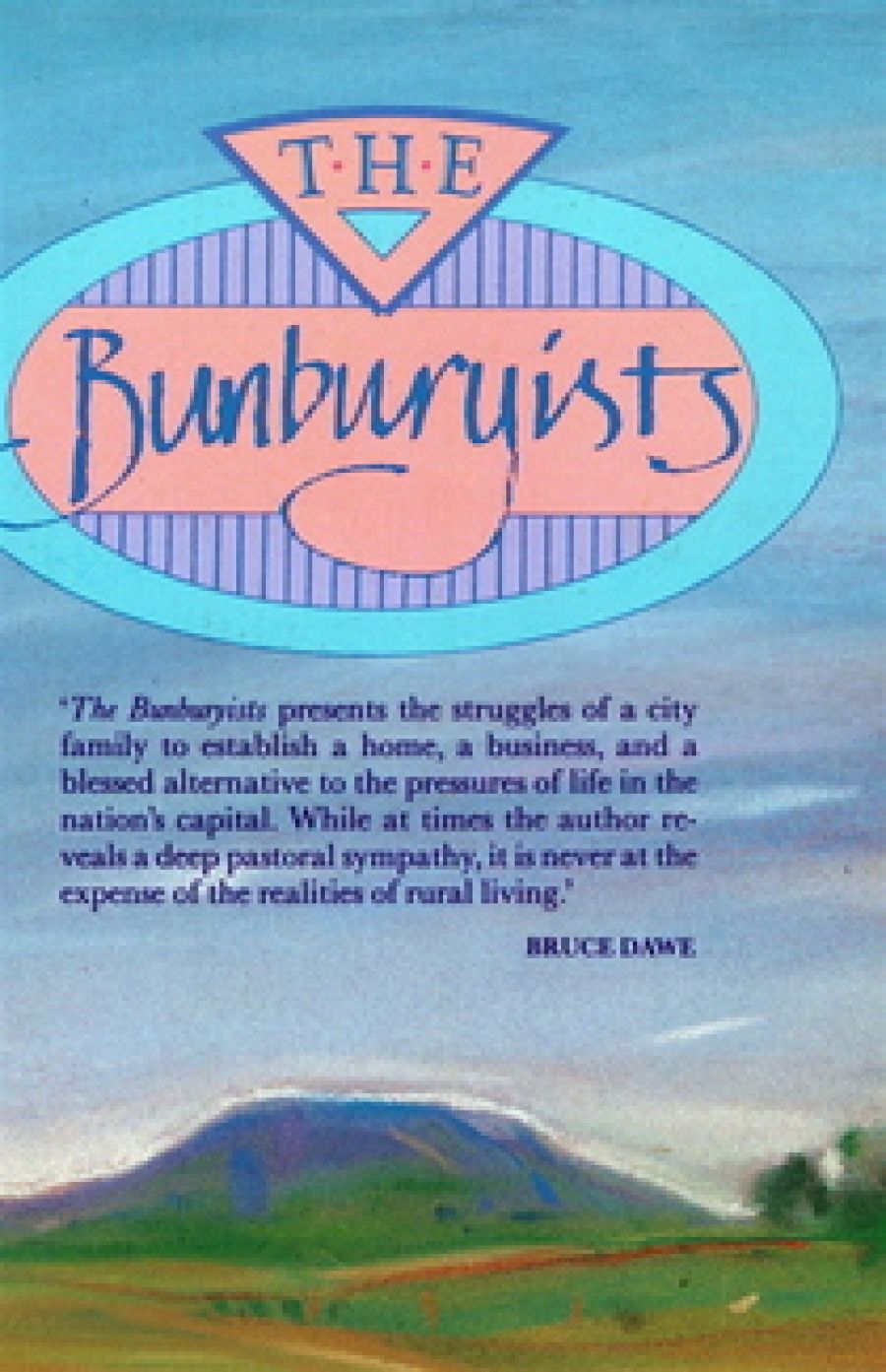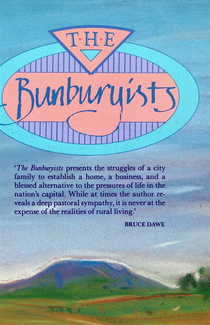
- Free Article: No
- Contents Category: Fiction
- Review Article: Yes
- Article Title: Wilde about the Bush
- Article Subtitle: : William and Oscar come home
- Online Only: No
- Custom Highlight Text:
The Bunburyists is a reminiscence of the author’s five years’ escape from the ‘dependent worlds of politics and journalism’.
I had fled with my family to the bush … where we sought to escape the present by returning to the past and setting ourselves up in business as dealers in antiques. Or at any rate, a superior kind of junk.
Today, as the novel opens, he finds himself again perched in the Parliamentary Press Gallery – ‘I have come back to work, to all I had sought to escape. The admission of defeat is self-evident. One more among many failings.’
- Book 1 Title: The Bunburyists
- Book 1 Biblio: Penguin, 216p., $6.95 pb
- Book 1 Cover Small (400 x 600):

- Book 1 Cover (800 x 1200):

I had fled with my family to the bush … where we sought to escape the present by returning to the past and setting ourselves up in business as dealers in antiques. Or at any rate, a superior kind of junk.
Today, as the novel opens, he finds himself again perched in the Parliamentary Press Gallery – ‘I have come back to work, to all I had sought to escape. The admission of defeat is self-evident. One more among many failings.’
Here is the germ of a novel in a well-defined Australian tradition, notwithstanding the tendency of the irony to self-laceration and self-pity; if the ‘lassitude[that] lies heavy over everything’ in Mr Hill’s Canberra grows from a surfeit of oppressive sunshine, it nevertheless recalls the atmosphere in that famous ‘dingy little office, where a stingy ray of sunlight struggles feebly down between the houses tall’. Unfortunately, there is little in The Bunburyists of the ‘wild erratic fancy’ that energises the backblocks for a Paterson, a Lawson or a Furphy.
Of course, the allusion of the novel’s title directs us to literary forbears of a very different stamp from these Australian pioneers. But the novel is as innocent of Wilde’s sophistication as it is of any peculiarly Australian literary extravagance. It has none of the flash of Wilde’s wit nor any of his alacrity for literary game playing. Earnestness in The Bunburyists, and there is much of it, owes more to Wordsworth via the suburban attitudinising of All Creatures Great and Small than to the urbane literary play of The Importance of Being … Here is a representative passage:
Look. High up here, among the clouds almost, you can see the whole world it seems. There, where the sky and the earth merge into one another, is the blue ridge of mountains. The unravelling hills. The olive expanse of bush, and paddocks thar are slashed here and there with purple and yellow. Paterson’s Curse and capeweed to the farmers, but here, part of the infinite pattern and glory of nature revealed. Unfolding. Everlasting ... So we stand, a man and his daughter, in contemplation of such beauty. Absorbed by it. At one with it. The soul transcended. For a little while, completely and inexpressibly at peace.
Experiences like this one Mr Hill calls, in Wordsworthian cadence, ‘moments which come upon us unannounced’ surely a more or less conscious. nod towards Wordsworth’s ‘spots of time’. But Wordsworth has been domesticated of course, made bittersweet. Further, one objects that the choice of model was ill-advised in the first place; despite the book’s record of drought and flood and bushfire, one must constantly make an effort of will to remember that its subject is not the dales but the Australian bush.
But, then, just how secure is Mr Hill’s command of his literary sources. The choice of title is certainly disastrously misleading; the book’s adulterated Wordsworthianism is inappropriate; the promise of the opening chapter (the most highly wrought apart from one or two of the scenes from Country Life – purely fictional short stories inserted into the main narrative in two blocks of five) in which an objectified persona is discovered against an oppressive urban backdrop of archetypal force, is soon dissipated as the intrusive authorial ego asserts itself and the narrative descends to mere autobiographical reportage. By the end of the book Mr Hill has forgotten that his return to work signifies that archetypal defeat the bush invariably inflicts on urban Australians. On the contrary, he assures us, sensibly and responsibly to be sure (but how dreary we find suburban good sense when the book might have offered so much more) that, spiritually refreshed from his sojourn new and exciting possibilities are now open to him and his family:
New horizons were there to be explored. All unknowing, I was quite ready to go back.
This first novel, for all its well-meaning gentlemanliness, for all its humane liberal sensibleness, for all its considerable, albeit essentially English rural charm, is unfortunately. a muddle of missed literary opportunities.


Comments powered by CComment